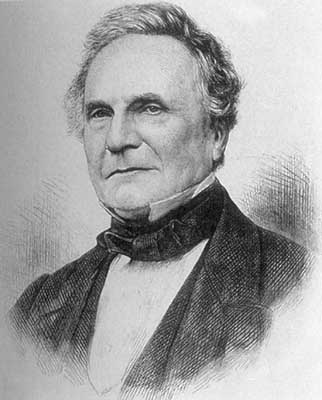| Profile | Major Works | Resources |
Charles Babbage, 1791-1871

Cambridge mathematician, philosopher and scientist, best known as the father of computing.
Born in Devonshire, the son of a banker, Charles Babbage was educated at Trinity College and Peterhouse, Cambridge. He pursued mathematics, and received an honorary degree (without honors) in 1814 and an MA in 1817. Disappointed by the Newtonian mathematics as taught at Cambridge, Babbage formed the Analytical Society in 1812, with Robert Woodhouse, John Herschel and George Peacock, to promote the use of the analytical calculus of Leibniz. William Whewell soon joined the effort and, in 1819, the Analytical Society was renamed the Cambridge Philosophical Society and by the 1830s the "Cambridge movement" had taken hold and displaced the Newtonian fluxions and fluents throughout many mathematical faculties in Britain.
Babbage's principal claim to fame is his invention of mechanical computing machines. His first effort was the "Difference Engine", a crankhandle-driven machine designed to calculate mathematical tables. He outlined the plan in 1822 and secured substantial government grants for the purpose. Babbage's initial efforts failed, but that did not deter his search for more funding and more ambitious designs. In 1837, he outlined an even grander machine, the "Analytical Engine", a general-purpose computer "programmable" by a punch-card system. Although it was never built, the mathematician Ada Lovelace (daughter of Lord Byron), who had been following Babbage's progress, designed the first program for such an engine.
This was only one of several inventions Babbage pursued. Babbage is also credited for the invention of the locomotive "cow catcher" (to clear rails of debris), the standard railway gauge and uniform postal rates.
In the early 1830s, Babbage was enthusiast for the growing statistics movement. It was through the efforts Babbage and Whewell that in 1832, that Quetelet was introduced to the British public and the British Association for the Advancement of Science introduced its Section F. Babbage was also the guiding spirit behind the foundation of the Statistical Society of London in 1833.
In his first treatise on economics (1832), Babbage naturally focused on the role of technological change and mechanical improvement. Babbage famously reproached political economists for "too small a use of facts and too large an employment of theory" (1832, p.119) - prompting Tooke to rebuke, "On the other hand, it appears to me that those who are par eminence called practical men may with equal justice be charged with too small an employment of theory and a super-abundance of facts" (Tooke, as quoted in Goldman (1983: p.598)).
It was here that he articulated the notorious "Babbage Principle" in industrial organization. As the division of labor naturally reduces complex tasks to simpler ones, the profitability of a firm is promoted not only because of the higher productivity of the technique, but also by the lower costs from intensive use of (cheap) unskilled labor, sufficient for the simpler task, rather than (expensive) skilled labor. Babbage's promotion of the idea of displacing skilled labor with unskilled labor in a well-designed factory helped spur the movement for "scientific management", or "Taylorism" in the late 19th C.
Babbage's Ninth Brigewater Treatise, is actually not part of the Bridgewater series but an independent contribution. [In 1829, inspired by the work of William Paley on natural religion, the Earl of Bridgewater established, through the Royal Society, a publication series to explore and promote the conciliation of natural science and religion. Thomas Chalmers and William Whewell contributed the first and third book in that series respectively. The only connection Babbage's volume had was in exploring the same topic; it was not commissioned or funded by Bridgewater and is not recognized as part of it.]
|
HET
|
|
Resources on Charles Babbage
|
All rights reserved, Gonçalo L. Fonseca
